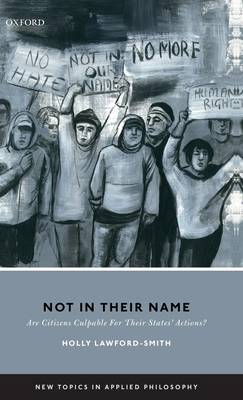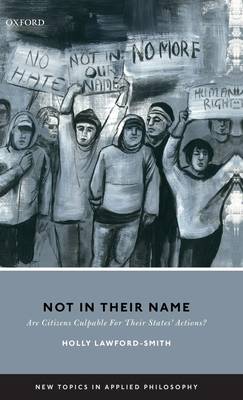
- Afhalen na 1 uur in een winkel met voorraad
- Gratis thuislevering in België vanaf € 30
- Ruim aanbod met 7 miljoen producten
- Afhalen na 1 uur in een winkel met voorraad
- Gratis thuislevering in België vanaf € 30
- Ruim aanbod met 7 miljoen producten
Zoeken
€ 95,45
+ 190 punten
Omschrijving
There are many actions that we attribute, at least colloquially, to states. Given their size and influence, states are able to inflict harm far beyond the reach of a single individual. But there is a great deal of unclarity about exactly who is implicated in that kind of harm, and how we should think about responsibility for it. It is a commonplace assumption that democratic publics both authorize and have control over what their states do; that their states act in their name and on their behalf. In Not In Their Name, Holly Lawford-Smith approaches these questions from the perspective of social ontology, asking whether the state is a collective agent, and whether ordinary citizens are members of that agent. If it is, and they are, there's a clear case for democratic collective culpability. She explores alternative conceptions of the state and of membership in the state; alternative conceptions of collective agency applied to the state; the normative implications of membership in the state; and both culpability (from the inside) and responsibility (from the outside) for what the state does. Ultimately, Lawford-Smith argues for the exculpation of ordinary citizens and the inculpation of those working in public services.
Specificaties
Betrokkenen
- Auteur(s):
- Uitgeverij:
Inhoud
- Aantal bladzijden:
- 208
- Taal:
- Engels
- Reeks:
Eigenschappen
- Productcode (EAN):
- 9780198833666
- Verschijningsdatum:
- 19/05/2019
- Uitvoering:
- Hardcover
- Formaat:
- Genaaid
- Afmetingen:
- 137 mm x 218 mm
- Gewicht:
- 362 g

Alleen bij Standaard Boekhandel
+ 190 punten op je klantenkaart van Standaard Boekhandel
Beoordelingen
We publiceren alleen reviews die voldoen aan de voorwaarden voor reviews. Bekijk onze voorwaarden voor reviews.







